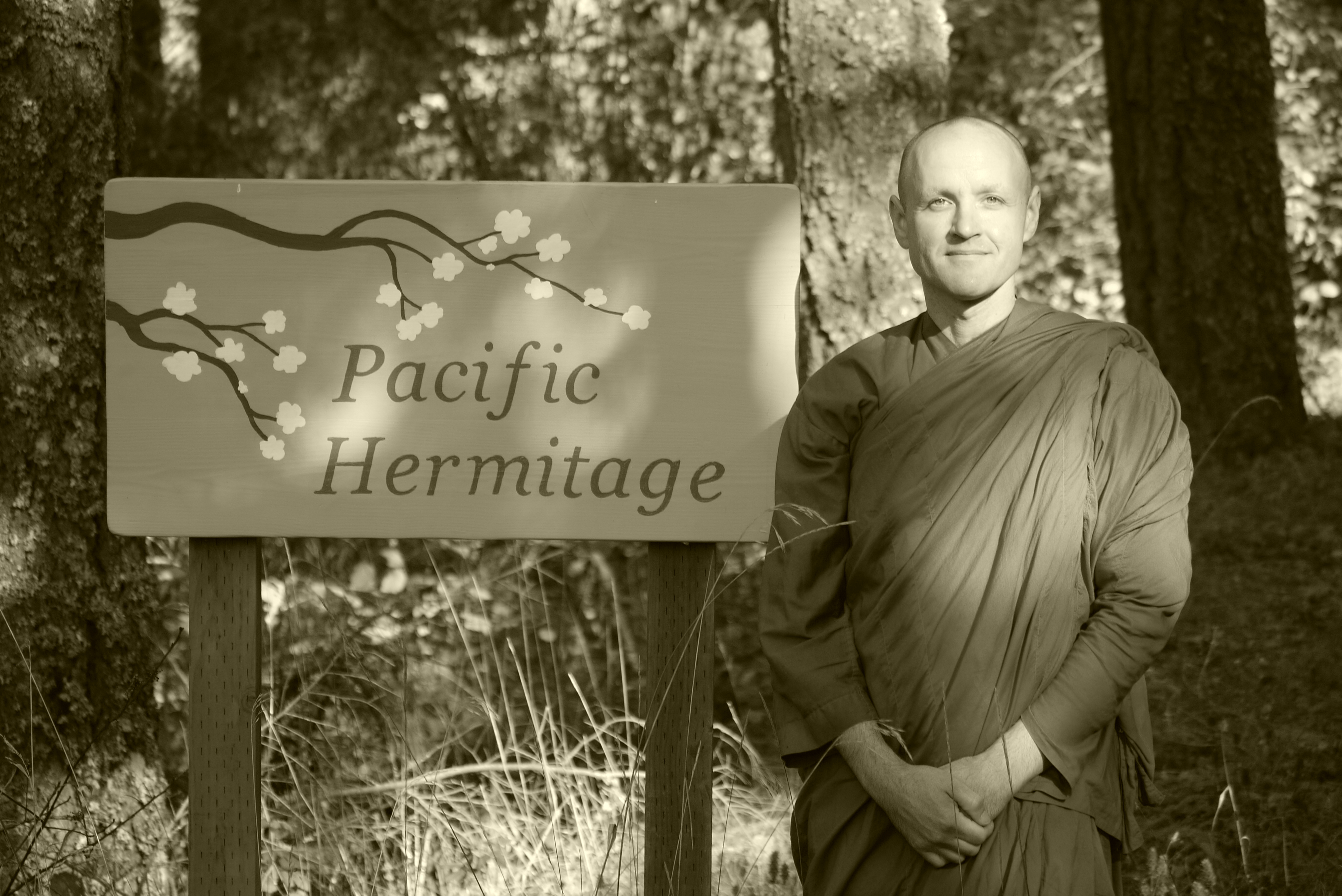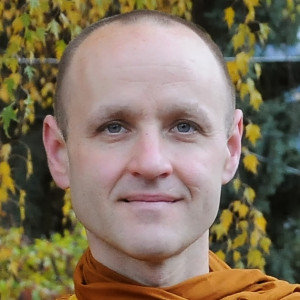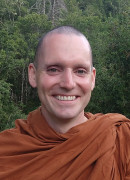The Pacific Hermitage

Nestled in the Columbia River Gorge, along a forested stretch of White Salmon’s Jewett Creek, is a small community of Theravada Buddhist monks. The Pacific Hermitage was established in 2010, as a branch of Abhayagiri Monastery (Redwood Valley, California) after lay Buddhists expressed a strong interest in and willingness to support monastic teachers for this region.
The Hermitage is a small monastery, intended to be a place of solitude where several monks can devote much of their time to meditation, study and simple living. The monks walk daily through the nearby town of White Salmon, Washington to accept food offerings for their daily meal and make themselves available as spiritual resources for the community. They offer Buddhist teachings, answer questions and lead meditation locally and in the region.
Because the Hermitage is a small residence only for monastics, it is not able to accommodate overnight guests. It has no monastic training program. Those interested in monastic training, residential retreats or staying overnight in a monastery of this tradition are encouraged to contact Abhayagiri or Temple Forest Monastery (New Hampshire).
Abhayagiri Monastery was the first United States monastery established by followers of Ajahn Chah, a respected Buddhist master of the Thai Forest Tradition of Theravada Buddhism.
The Tradition
The Thai Forest tradition is one branch of the Theravada Buddhist tradition. Theravada Buddhism, also known as the Southern School of Buddhism, is present throughout Thailand, Burma, and Sri Lanka. The Theravada tradition is grounded in the discourses recorded in the Pali Canon, the oldest Buddhist scriptures. Theravada literally means the Way of the Elders, and is named so because of its strict adherence to the original teachings and rules of monastic discipline expounded by the Buddha.
The Thai Forest tradition is the branch of Theravada Buddhism in Thailand that most strictly holds the original monastic rules of discipline laid down by the Buddha. The Forest tradition also most strongly emphasizes meditative practice and the realization of enlightenment as the focus of monastic life. Forest monasteries are primarily oriented around practicing the Buddha’s path of contemplative insight, including living a life of discipline, renunciation, and meditation in order to fully realize the inner truth and peace taught by the Buddha. Living a life of austerity allows forest monastics to simplify and refine the mind. This refinement allows them to clearly and directly explore the fundamental causes of suffering within their heart and to inwardly cultivate the path leading toward freedom from suffering and supreme happiness. Living frugally, with few possessions fosters for forest monastics the joy of an unburdened life and assists them in subduing greed, pride, and other taints in their minds.
Forest monastics live in daily interaction with and dependence upon the lay community. While laypeople provide the material supports for their renunciant life, such as almsfood and cloth for robes, the monks provide the laity with teachings and spiritual inspiration. Forest monks follow an extensive 227 rules of conduct. They are required to be celibate, to eat only between dawn and noon, and not to handle money.
For more on the monastic tradition see the “The Thai Forest Tradition” on the Abhayagiri website.
The Monks
Ajahn Sudanto
Born in Portland, Oregon in 1968, Ajahn Sudanto became interested in Buddhism and Indian spiritual traditions while completing a Bachelor of Fine Arts from the University of Oregon. After graduation he set off for a open-ended period of travel and spiritual seeking in India and Southeast Asia. After a year of traveling, he proceeded to Thailand to begin a period of intensive study and meditation, which drew him to Wat Pah Nanachat in the Northeast of Thailand. There he met Ajahn Pasanno (then the abbot) and requested to ordain and train with the resident community, taking full ordination as a bhikkhu in 1994. After training for five years at Wat Pah Nanachat and various branch monasteries in the Ajahn Chah tradition, he came to Abhayagiri to live and train with the emerging sangha in America.
Ajahn spent the summer of 2007 together with Ajahn Karunadhammo in the Columbia River Gorge on retreat in an impromptu forest hermitage supported by the Portland Friends of the Dhamma. Later he was asked by the Abhayagiri community to lead the effort to establish the Pacific Hermitage in 2010.
Ajahn Sudanto is on sabbatical for the entirety of 2021 and winter of 2022. He was residing at Abhayagiri Monastery for his first year away in 2021 and is spending the winter at Birken Monastery in British Columbia until his return in early Spring, 2022.
Venerable Hemako
Venerable Hemako was born in 1990 in rural Massachusetts. Curious about nature and the universe he studied physics at university and began meditating in his early 20s. After graduating he worked in education and on a vegetable farm before moving to New Zealand. There he first visited an Ajahn Chah branch monastery. To pursue monastic life he traveled to Abhayagiri, where he took anagārika ordination in 2022, novice ordination in 2023, and obtained full acceptance into the Bhikkhu Sangha in 2024 .
Ven. Hemako will be arriving in early Janruary 2025 for the winter retreat at the hermitage.


